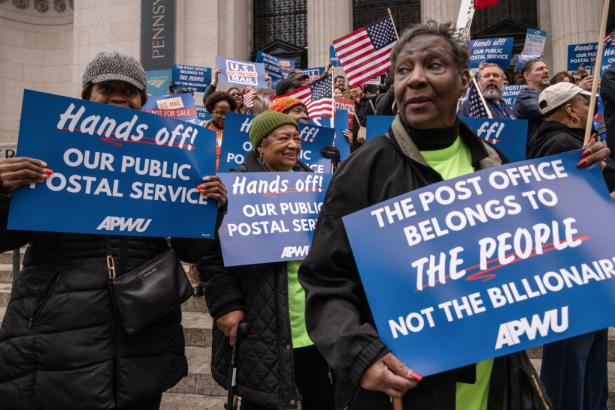Fueled by Donald Trump’s billionaire cabinet and the Department of Government Efficiency’s (DOGE) anti-government crusade, privatizers are on the prowl. The first month of Trump 2.0 has been a bonanza of unabashed scamming and self-dealing by the country’s wealthy elite. The administration has sent a clear signal to profiteers: now’s your chance to get in on the action.
Major financial institutions are giddy at the prospect. Last month, Wells Fargo released a memo outlining political pathways to achieve postal privatization and the various opportunities for profit. Their plan is clear: sell off the most profitable parts, raise prices, and decimate the unionized workforce. The scheme represents an attack on the very foundations of this popular universal public service.
“An Obvious Source of Value”
Wells Fargo envisions a postal service where the mail is kept as a taxpayer-funded government entity while the package and parcel components, which are more profitable, are “sold or IPOed.” In order for the new private company to earn a decent profit, “USPS would need to raise prices by ~30-140% across its product line.”
A privatized postal system would also take aim at the Universal Service Obligation, which requires mail to be delivered to every address six days a week. Such dedication to equitable service “would be a challenge for a third-party operator to profitably move mail and packages,” the memo complains. This move would also put pressure on the proposed mail-only service, which would likely be financially hobbled, to downgrade from six-day delivery as well.
With surprising candor, the memo admits that privatization will cause “less job security amid inevitable loss of union protections, loss of pension benefits, higher healthcare costs and employee/wage restructuring.”
With post offices in every zip code, it’s not surprising that Wells Fargo is also looking at real estate as a major source of profit. The company estimates the real estate value for the USPS to be as much as $88 billion. This includes “smaller post office facilities” Wells Fargo would love to sell off or lease. These post offices serve as critical pieces of public infrastructure, especially in small towns and rural areas.
“Particularly Strong Affinity”
The authors of this memo are aware that USPS privatization will not be an easy task. They’re forced to acknowledge that “public, private, labor, and federal support of the USPS remains high” because it “provides critical services to many communities.” Additionally, rural customers have a “particularly strong affinity.” This speaks to the reality that the USPS does much more than just deliver mail; people rely on it for election ballots, medicine, financial services, and more.
Wells Fargo is smart enough to know that the main bulwarks of opposition to privatization are the major postal unions. Referencing the Great Postal Strike of 1970, the memo’s authors fear the prospect of “employees jointly striking and causing material damage” to the economy as a whole.
They’re right to be worried about the consequences of organized opposition from postal workers. Nor is the notion far-fetched: there are currently rumblings among the rank and file that could link postal workers’ militancy to a broader fight against privatization. As Labor Notes has reported, a new caucus in the National Association of Letter Carriers (NALC) called Build a Fighting NALC led a movement to overwhelmingly vote down the latest tentative agreement from USPS (which offered a measly 1.3 percent annual raise). They also pushed the national union to endorse their national day of action on March 23.
Wells Fargo is right about one thing: with postal workers in motion, a privatization ploy won’t go down without a fight. As the memo begrudgingly admits, the USPS enjoys majority support from the American public that allies can build on to defend against these attacks. It has been a critical source of stable unionized employment, especially for African Americans and veterans.
If the Wells Fargo memo is any indication, the silver lining is that they know we have the power to stop them.
Paul Prescod is a Jacobin contributing editor.
Our new issue, “Progress,” is out next week. Subscribe to our print edition at a discounted rate today.


Spread the word